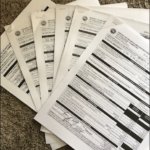 WASHINGTON – U.S. Representatives Jackie Walorski (R-Ind.) and Ron Kind (D-Wis.) Thursday introduced the Import Tax Relief Act, a bipartisan bill that would require the Executive Branch to create an exclusion process for List 3 (and any future list) of Chinese imports subject to Section 301 tariff imposition. Consistent with precedent and requirements placed on the United States Trade Representative (USTR) in the recent government funding bill, United States companies would also be able to apply for a refund for duties paid on imported good subject to these tariffs that are granted an exclusion. Senators James Lankford (R-Okla.) and Chris Coons (D-Del.) introduced companion legislation in the Senate.
WASHINGTON – U.S. Representatives Jackie Walorski (R-Ind.) and Ron Kind (D-Wis.) Thursday introduced the Import Tax Relief Act, a bipartisan bill that would require the Executive Branch to create an exclusion process for List 3 (and any future list) of Chinese imports subject to Section 301 tariff imposition. Consistent with precedent and requirements placed on the United States Trade Representative (USTR) in the recent government funding bill, United States companies would also be able to apply for a refund for duties paid on imported good subject to these tariffs that are granted an exclusion. Senators James Lankford (R-Okla.) and Chris Coons (D-Del.) introduced companion legislation in the Senate.
In a Ways and Means Committee hearing Thursday, Walorski pressed U.S. Trade Representative Robert Lighthizer on the lack of a product exclusion process for the third round of tariffs on Chinese imports. In response to questions from Walorski, Lighthizer indicated USTR would not meet the 30-day deadline to establish a process as directed by Congress in the recent funding bill.
“I support President Trump’s goal of stopping China’s unfair trade practices, but we need to do so in a way that does not harm American farmers, manufacturers, and workers,” Congresswoman Walorski said. “A fair and transparent exclusion process for the latest round of China tariffs is long overdue, but it is clear USTR does not intend to meet the deadline imposed by Congress to establish one. As a result, this bipartisan bill is necessary to provide much-needed relief to the American businesses and consumers paying the cost of these import taxes. I am hopeful the ongoing trade talks with China will lead to long-term benefits for our economy, but the administration must do more to create certainty for businesses and farmers and to stay focused on the goal of holding China accountable.”
“American companies deserve a process to petition our government to prove how and why these tariffs are hurting their bottom line, their workers, and their consumers. The Administration’s unwillingness to create this exemption process has forced Congress to reassert its Constitutionally granted powers, and move forward in finding a soft landing zone for our workers, farmers and families – with or without the help of the Administration,” said Rep. Ron Kind.
“US importers deserve a chance to petition their government for import tax relief, and this bill would set up a process to do just that,” said Sen. James Lankford. “I have heard from many Oklahoma businesses that have expressed concern about the impact these tariffs will have on their ability to hire employees, give back to their communities, and expand their business operations. Already, American importers have paid the US government more than $12 billion in import taxes due to last year’s tariff action on Chinese imports, which has a direct impact on our economy since those costs are passed down to consumers in the form of price increases on food, clothing, and shelter, on which low-income families spend a disproportionate share of their incomes compared to wealthier families. Unfortunately, this has resulted in a reverse-redistribution of wealth, whereby Americans basically end up paying their government $12 billion. I am proud to partner with Senator Coons to introduce this bipartisan, bicameral legislation to help provide necessary financial relief for families and businesses across the US.”
“It is time for China’s unfair trade practices to come to an end,” said Sen. Chris Coons. “It is vital, though, that the Administration not harm our own American companies in the course of pressuring China. That’s why I’m introducing the bipartisan Import Tariff Relief Act, to require that US companies be given the opportunity to apply for exclusions from tariffs on Chinese goods. If you manufacture a product here in America, you shouldn’t have your supply chain upended for this trade war.
BACKGROUND
The first two rounds of tariffs imposed under Section 301 of the Trade Act of 1974 included an exclusion process (the process by which U.S. importers can request exemption from the tariffs), but the third round, imposed on $200 billion worth of Chinese goods, did not include such a process. The third tranche of tariffs was imposed on September 24, 2018, pursuant to Section 301 of the Trade Act of 1974.
According to the Congressional Research Service, as of February 21, U.S.-based importers have paid $12.2 billion to the government as a result of tariffs imposed under Section 301 of the Trade Act of 1974, more than double the $5.8 billion collected in tariffs on steel and aluminum pursuant to Section 232 of the Trade Act of 1974.
In October, Walorski and Kind led a bipartisan coalition of 169 members of Congress in calling on Lighthizer to establish an exclusion process in regards to Section 301 tariffs.
Video of Walorski questioning Lighthizer is available here.
Walorski represents the 2nd Congressional District of Indiana, serving as a member of the House Ways and Means Committee.














